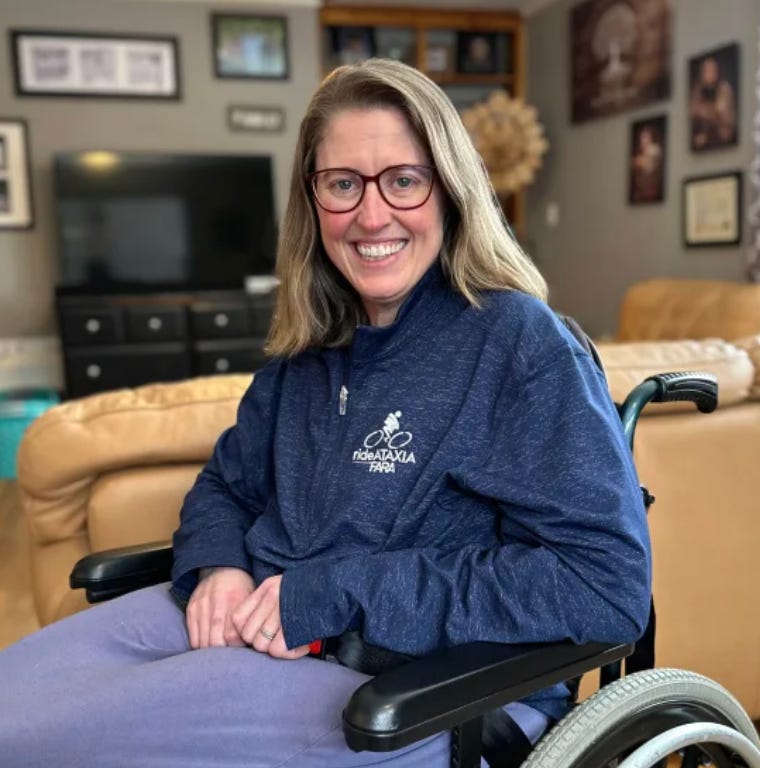Vermont's Mary Nadon Scott Wins National Award for Rare Disease Advocacy
This Community Champion award isn't just recognition—it's a testament to Scott's deserving place among rare disease heroes.
Anyone who knows Mary Nadon Scott has witnessed her boundless drive to infuse positivity and resilience into every corner of her world. In her hometown of Northfield, Vermont, she leads a local initiative dedicated to enhancing accessibility and walkability, setting a benchmark for grassroots community engagement that inspires neighbors and advocates alike.
On July 16, 2025, that same unyielding spirit earned Scott a prestigious national accolade: the Community Champion honor at the National Organization for Rare Disorders' 2025 Industry Innovation and Rare Impact Awards. According to the organization's announcement, this annual event celebrates trailblazers who advance treatments, research, advocacy, and policy changes in a field where roughly 95% of the 10,000 known rare disorders still lack approved therapies.
Reports on the awards highlight that they spotlight a select group of innovators, from pharmaceutical pioneers to patient advocates, whose efforts bring tangible hope to underserved communities. Past honorees have included medical researchers, policymakers, and even high-profile figures like Emmy-winning journalists, underscoring the recognition's role as a beacon for transformative work in rare disease awareness and equity.
Scott, who has lived with Friedreich's ataxia—a progressive neurological disorder that affects coordination, balance, and speech—since her diagnosis in 2001 during her time at the University of Vermont, has transformed personal adversity into a powerhouse of advocacy.
As a founding member of the Vermont Rare Disease Advisory Council Coalition, she has built an inclusive network that unites patients, families, healthcare providers, and policymakers to address the unique challenges faced by the state's estimated 1 in 10 residents with rare conditions, based on accounts from advocacy groups and state records.
What sets Scott apart—and undoubtedly secured her this honor—is her hands-on impact on legislative and community levels. In 2024, she played a pivotal role in advocating for Vermont's H.766 bill, a landmark step-therapy reform signed into law by Governor Phil Scott, as detailed in legislative summaries and her own shared experiences. This legislation curbs insurance barriers by exempting certain patients from "fail-first" protocols, expediting prior authorizations, and prioritizing patient needs over bureaucratic delays.
Scott's testimony before the Senate Health and Welfare Committee was particularly poignant; she shared her lived experiences with Friedreich's ataxia, asserting, "I know my body better than my insurance company does," to emphasize the urgency of patient autonomy.
Her efforts have directly improved access to vital treatments for Vermonters with rare diseases, reducing isolation and financial strain.Scott's advocacy extends nationally as well. Since becoming a Friedreich's Ataxia Research Alliance Ambassador in 2015, she has supported patients across the country, organizing events to combat loneliness and fund research, according to the alliance's updates.
She has been a fixture at Rare Disease Week on Capitol Hill, meeting with lawmakers like Sen. Patrick Leahy to push for protections on pre-existing conditions—efforts Leahy highlighted during Supreme Court hearings in 2020, as noted in congressional records. Locally, she has coordinated Rare Disease Day proclamations with Vermont officials, including multiple collaborations with Gov. Scott, and distributed awareness materials statewide to educate communities, per state proclamations and community reports.
Even amid the disorder's progression, which has necessitated mobility aids and crowdfunding support in 2021, Scott remains active on social media under the handle@maryfrances_87 on Instagram, sharing her journey to inspire others.
This Community Champion award isn't just recognition—it's a testament to Scott's deserving place among rare disease heroes. In a landscape where systemic gaps leave millions without options, her work exemplifies how one person's tenacity can spark policy shifts, build supportive networks, and ignite hope.
As the National Organization for Rare Disorders' CEO Pamela K. Gavin noted in the announcement, honorees like Scott are "driving scientific breakthroughs" and "bringing hope to the rare disease community."
Congratulations poured in on social platforms, with peers calling her "a great friend and an example to all of us in the rare disease community."
For Scott, this honor validates years of tireless effort, but more importantly, it amplifies her mission: ensuring no one faces a rare disease alone. In Northfield and beyond, she's not just an advocate—she's a catalyst for change.


